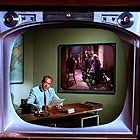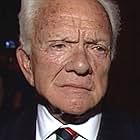The Quiz Show Scandal
- L’episodio è andato in onda il 6 gen 1992
VALUTAZIONE IMDb
7,2/10
30
LA TUA VALUTAZIONE
Aggiungi una trama nella tua linguaAmerica's love affair with the quiz show is dealt a blow when it's revealed that the games are fixed.America's love affair with the quiz show is dealt a blow when it's revealed that the games are fixed.America's love affair with the quiz show is dealt a blow when it's revealed that the games are fixed.
Foto
Jack Barry
- Self
- (filmato d'archivio)
Joyce Brothers
- Self
- (filmato d'archivio)
Dan Enright
- Self
- (as Daniel Enright)
Charles E Jackson Jr.
- Self
- (as Reverand Stoney Jackson)
Mert Koplin
- Self
- (as Merton Koplin)
Robert F. Lewine
- Self
- (as Robert Lewine)
Will Lyman
- Narrator
- (voce)
Ralph Paul
- Self
- (filmato d'archivio)
Ralph Story
- Self
- (filmato d'archivio)
Trama
Lo sapevi?
- ConnessioniReferences Fronte del porto (1954)
Recensione in evidenza
One sweltering evening in New York in 1955, Sonny Fox, producer of the $64,000 Question, was walking down a residential street, where all the windows had been left open. Each home, without exception, was tuned-in to that very programme. It was the show that could empty the bars.
That figure of $64,000 had its roots in a radio quiz offering just $64 top prize, a handsome little bonus, no doubt, but the opportunities provided by TV prompted a commercial sponsor to add three zeroes to that figure, signalling an entirely new era, where the winner might find himself on the front cover of Time magazine.
On this video we are told that American TV quizzes had once been entirely free of corruption. But 'once' is the word. Sponsors were quick to spot the limitations of a fair-play contest, with a high risk of nothing much being won, and demanded certain interventions to stimulate drama, suspense... and high ratings. Reluctantly or otherwise, the producers had to learn to manipulate results, which could only be done by manipulating the ethical boundaries of competitors and programme staff alike.
One thing the audience didn't want was an expert answering questions on their own specialist area of study. They wanted the opposite - a housewife guessing correctly about quantum theory or a gardener quoting Whitman or Longfellow. So there was a lot of fabricating of human types to fit the profile of popular winners.
Whistleblowers didn't get much encouragement from a nervous press, demanding irrefutable proof, until one programme executive discovered a wad of papers left lying around with lists of answers. Mailing these to himself by registered post, he was able to demonstrate that they matched the questions being asked on those evenings. Even in court, there was shocking perjury, in an attempt to save the situation, but inevitably it led to the famous 'domino effect' - dozens of quiz-shows going to the wall, one after another. It had been a short, but brilliant heyday for the TV Quiz, all over by 1958. "In the 50's, seeing was believing" reflects our commentator, a little sadly, lamenting what we now regard too easily as an age of innocence.
That figure of $64,000 had its roots in a radio quiz offering just $64 top prize, a handsome little bonus, no doubt, but the opportunities provided by TV prompted a commercial sponsor to add three zeroes to that figure, signalling an entirely new era, where the winner might find himself on the front cover of Time magazine.
On this video we are told that American TV quizzes had once been entirely free of corruption. But 'once' is the word. Sponsors were quick to spot the limitations of a fair-play contest, with a high risk of nothing much being won, and demanded certain interventions to stimulate drama, suspense... and high ratings. Reluctantly or otherwise, the producers had to learn to manipulate results, which could only be done by manipulating the ethical boundaries of competitors and programme staff alike.
One thing the audience didn't want was an expert answering questions on their own specialist area of study. They wanted the opposite - a housewife guessing correctly about quantum theory or a gardener quoting Whitman or Longfellow. So there was a lot of fabricating of human types to fit the profile of popular winners.
Whistleblowers didn't get much encouragement from a nervous press, demanding irrefutable proof, until one programme executive discovered a wad of papers left lying around with lists of answers. Mailing these to himself by registered post, he was able to demonstrate that they matched the questions being asked on those evenings. Even in court, there was shocking perjury, in an attempt to save the situation, but inevitably it led to the famous 'domino effect' - dozens of quiz-shows going to the wall, one after another. It had been a short, but brilliant heyday for the TV Quiz, all over by 1958. "In the 50's, seeing was believing" reflects our commentator, a little sadly, lamenting what we now regard too easily as an age of innocence.
- Goingbegging
- 14 mag 2022
- Permalink
I più visti
Accedi per valutare e creare un elenco di titoli salvati per ottenere consigli personalizzati
Dettagli
- Colore
- Mix di suoni
- Proporzioni
- 1.33 : 1
Contribuisci a questa pagina
Suggerisci una modifica o aggiungi i contenuti mancanti





